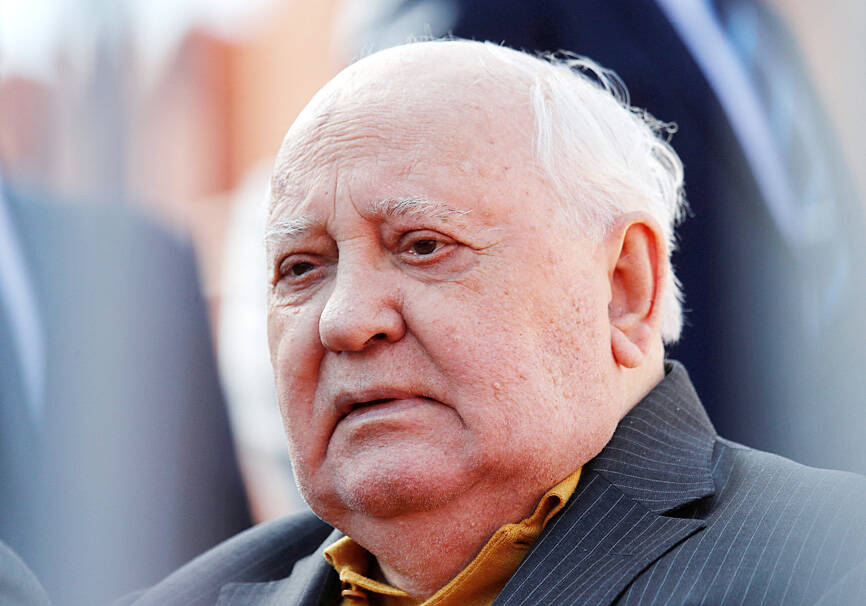Before Mikhail Gorbachev came along, the Soviet Union seemed an immovable superpower in perpetual antagonism to the US, but with a breathtaking series of reforms, he changed all that as president, redirecting the course of the 20th century.
Alongside former US president Ronald Reagan and former British prime minister Margaret Thatcher, Gorbachev was a key protagonist in a global drama that many thought impossible and, for those who lived through it, seemed almost surreal.
Under Gorbachev, the Berlin Wall crumbled, thousands of political prisoners were released and millions of people who had known only communism got their first glimpse of freedom.

Photo: Reuters
However, he was unable to control the forces he unleashed and ultimately waged a losing battle to salvage a crumbling empire.
Gorbachev died on Tuesday at a Moscow hospital.
He was 91.
Although little known outside Sovietologist circles before he became leader in 1985, he quickly became a dominant and charismatic figure on the world stage. The splotchy purple birthmark on his bald pate made him instantly recognizable, and his vigor stood in sharp contrast to a run of aged and barely articulate Kremlin leaders.
His vision of remaking the Soviet Union into a more humane and flexible country had the power of the epochal.
By 1990, he had won the Nobel Prize for his “leading role” in ending the Cold War and reducing nuclear tensions.
However, a year later, he was the sad and bewildered embodiment of failure. The country had fallen apart in his hands, and at home he was derided, despised and increasingly shunted aside as irrelevant.
His power hopelessly sapped by an attempted coup against him in August 1991, Gorbachev spent his last months in office watching republic after republic declare independence until he resigned on Dec. 25, 1991, and the Soviet Union wrote itself into oblivion a day later.
Many of the changes, including the Soviet breakup, bore no resemblance to the transformation that Gorbachev had envisioned when he became Soviet leader in March 1985.
By the end of his rule, he was powerless to halt the whirlwind he had sown. Yet Gorbachev might have had a greater impact on the second half of the 20th century than any other political figure.
“I see myself as a man who started the reforms that were necessary for the country and for Europe and the world,” Gorbachev told reporters in a 1992 interview shortly after he left office. “I am often asked, would I have started it all again if I had to repeat it? Yes, indeed. And with more persistence and determination.”

CHIP WAR: The new restrictions are expected to cut off China’s access to Taiwan’s technologies, materials and equipment essential to building AI semiconductors Taiwan has blacklisted Huawei Technologies Co (華為) and Semiconductor Manufacturing International Corp (SMIC, 中芯), dealing another major blow to the two companies spearheading China’s efforts to develop cutting-edge artificial intelligence (AI) chip technologies. The Ministry of Economic Affairs’ International Trade Administration has included Huawei, SMIC and several of their subsidiaries in an update of its so-called strategic high-tech commodities entity list, the latest version on its Web site showed on Saturday. It did not publicly announce the change. Other entities on the list include organizations such as the Taliban and al-Qaeda, as well as companies in China, Iran and elsewhere. Local companies need

CRITICISM: It is generally accepted that the Straits Forum is a CCP ‘united front’ platform, and anyone attending should maintain Taiwan’s dignity, the council said The Mainland Affairs Council (MAC) yesterday said it deeply regrets that former president Ma Ying-jeou (馬英九) echoed the Chinese Communist Party’s (CCP) “one China” principle and “united front” tactics by telling the Straits Forum that Taiwanese yearn for both sides of the Taiwan Strait to move toward “peace” and “integration.” The 17th annual Straits Forum yesterday opened in Xiamen, China, and while the Chinese Nationalist Party’s (KMT) local government heads were absent for the first time in 17 years, Ma attended the forum as “former KMT chairperson” and met with Chinese People’s Political Consultative Conference Chairman Wang Huning (王滬寧). Wang

CROSS-STRAIT: The MAC said it barred the Chinese officials from attending an event, because they failed to provide guarantees that Taiwan would be treated with respect The Mainland Affairs Council (MAC) on Friday night defended its decision to bar Chinese officials and tourism representatives from attending a tourism event in Taipei next month, citing the unsafe conditions for Taiwanese in China. The Taipei International Summer Travel Expo, organized by the Taiwan Tourism Exchange Association, is to run from July 18 to 21. China’s Taiwan Affairs Office spokeswoman Zhu Fenglian (朱鳳蓮) on Friday said that representatives from China’s travel industry were excluded from the expo. The Democratic Progressive Party government is obstructing cross-strait tourism exchange in a vain attempt to ignore the mainstream support for peaceful development

ELITE UNIT: President William Lai yesterday praised the National Police Agency’s Special Operations Group after watching it go through assault training and hostage rescue drills The US Navy regularly conducts global war games to develop deterrence strategies against a potential Chinese invasion of Taiwan, aimed at making the nation “a very difficult target to take,” US Acting Chief of Naval Operations James Kilby said on Wednesday. Testifying before the US House of Representatives Armed Services Committee, Kilby said the navy has studied the issue extensively, including routine simulations at the Naval War College. The navy is focused on five key areas: long-range strike capabilities; countering China’s command, control, communications, computers, cyber, intelligence, surveillance, reconnaissance and targeting; terminal ship defense; contested logistics; and nontraditional maritime denial tactics, Kilby